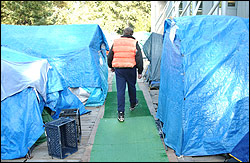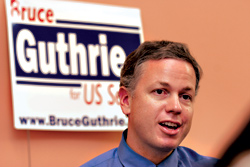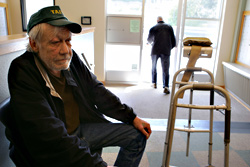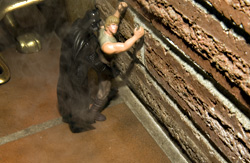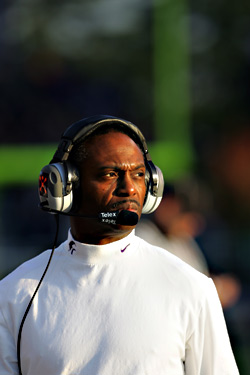Six months ago, Mark Kelly became homeless and moved into Tent City 4. That’s the roving encampment in the Eastside suburbs that, for about the past year, has spurred outrage from paranoid neighbors in Bothell and Kirkland at the prospect of the homeless living in proximity. Sited alternately on public land and church property, the camp of about 100 people moves every 90 days. Like sister project Tent City 3 in Seattle, it’s a traveling political statement about homelessness.
But the city of Bellevue, knowing it would be a future tent-city site, last fall passed a string of picayune restrictions on Tent City, in advance of its inevitable arrival. Forty residents instead of 100. Sixty days instead of 90. Special fire safety exit doors. Restrictions on food handling. (Not that there had been problems with Tent City’s food handling at other locations.) This would be the Bellevue way.
So in mid-November, the camp moved to a grassy swath of land alongside of Temple B’Nai Torah, a Reform congregation in Bellevue. And one morning, Kelly, a homeless former U.S. Postal Service worker, found himself being scolded over milk by a Bellevue city employee. That attitude is why the affair is in federal court. Really.
In its many iterations, Tent City has always been controversial. Back in 2001, the city of Seattle went to court over the encampment. But things had largely calmed. The camps are tidy, safe, and well run; have their own security; and, with few exceptions, don’t create problems for police or neighbors. So why did Bellevue decide to push back so hard?
“We ask ourselves every day,” says Brent Carson, president of Temple B’Nai Torah, which invited Tent City for a 90-day visit and asked the city for a 90-day permit. “I don’t have an answer. Bellevue surprised me.”
Tim Waters, a city spokesperson, says Bellevue went through a long, thoughtful planning process “to draft an ordinance that spelled out safeguards to ensure that safety and health requirements were consistent with community standards.” One shower for every 40 people in the camp, individually packaged cheese, temperature gauges in ice coolers, and all milk in individual-serving-sized containers. None of these restrictions was imposed on Tent City in other locations, so had Bellevue learned of a botulism outbreak in Bothell that no one else had heard of?
Waters would only say, “The ordinance was not developed lightly.” Homeless advocates say something else is afoot, however—a clear attempt to limit the size of the camp and how long it can stay.
“They are approaching Tent City 4 the way other communities have, which is with a fair amount of prejudice,” says the Rev. Sandy Brown, executive director of the Church Council of Greater Seattle, a longtime backer of the tent- cities concept.
Whatever Bellevue’s impulse, the temple felt that the restrictions clashed with a religious mission of feeding the homeless and welcoming strangers. So the congregation appealed the restrictions through the land-use legal process last month. The city, employing pricey Preston Gates Ellis attorneys, had the case removed to U.S. District Court, contending that there were federal issues—essentially allowing a city to legislate religious expression where the homeless were involved.
Already, the city is running into trouble in federal court. At a status hearing on Dec. 5, U.S. District Judge John Coughenour in Seattle made it crystal clear to Bellevue attorneys what he thought of the case, according to participants in the hearing. Responding to one line of the city’s legal explanations of the restrictions, the judge said, “If I were you, I’d go back and talk to your client. Your client is not looking very good in my court right now.”
A lawyer for the temple raised the point that the judge would need to rule before mid-January on the 60-day restriction, or it would be moot. “We’ll get an answer,” said the judge. “You may even like it.”
In the current location, Tent City 4 has areas for residents to watch television or choose from among 100 videotapes. Nearby hangs a hand-drawn welcome sign from children in the congregation. There are shelves of donated books. A kitchen stocked with donated food. Two rows of small tents pitched on wooden pallets, surrounded by cyclone fencing sheathed with black plastic. A shower. Portable toilets. And a $3,000 exit door that Bellevue fire officials required.
According to Kelly, city code enforcers visit the camp every other day. He says the camp has yet to receive a written violation, but they are being offered lots of pointers. “They are screwing with us,” says Kelly. “The system we’ve used elsewhere works. They put these restrictions on us because they don’t want us around.”
One recent morning, a Bellevue code enforcer opened one of the camp’s coolers and discovered milk stored in gallon-sized containers. He reminded Kelly that the ordinance called for individual containers on the half-pint scale. Kelly rolls his eyes at the memory. “They went after us for trash cans, too,” he says. “Our lids weren’t fitting tightly enough.”
Another hearing is scheduled for Dec. 21 in federal court. A ruling is expected by mid-January. Tent City 4 already has an invitation to camp at another Bellevue church in mid-February, but if the judge rules against the camp, it might be homeless for 30 days.
